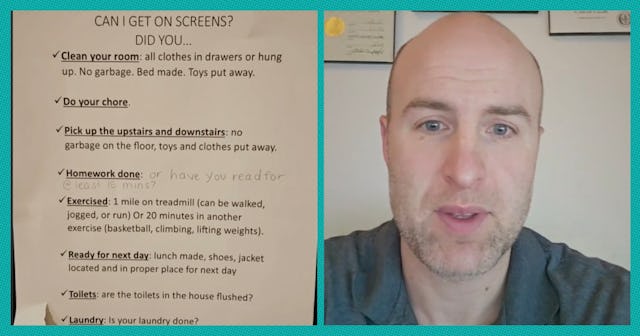This Dad’s Checklist Of Household Tasks His Kids Must Do Before Any Screen Time Went Viral
“We should not be giving our kids unlimited access to screens.”

Richard Wadsworth posted a now-viral video of his son lifting weights in what appears to be their home gym. The young boy works with some arm weights while telling his dad he woke up at 6:30 in the morning to get the workout done.
At first glance, any parent would be flummoxed at this sight. Why would a tween ever voluntarily wake up before the sun rises to get in the gym and work out?
Wadsworth, who has seven children between the ages of 1 and 14, showed his followers how and why his son did exactly this, and it’s all about choice and incentive.
“Let me show you kind of where this started. This right here,” he says while panning to a typed-out checklist of household tasks his children must do before they are allowed to have any screen time.
Wadsworth, a medical doctor and a psychiatrist, explained that he doesn’t make his children exercise, but if they want to enjoy their phones or tablets, certain tasks need to be completed. The choice is up to them.
“And there’s a list of things that they need to do here. And right here is: ‘Did you exercise?’ And my son has chosen to do his 20 minutes of lifting weights,” he explained.
“I’m not forcing my son to exercise every day, but I am setting rules and boundaries around his screen time. He decided he wanted to have more time after school to play with his friend. And so in order to do that, he realized that he’d need to wake up a little bit earlier and exercise in the morning.”
He continued, “You see, we have all of their screens locked away. And if they want access to any of them, they need to come ask us and we’ll go through the list together. And they’re not getting their screens until the list is done.”
Wadsworth compares screen time to any other kind of consumption by kids that parents tend to keep a close eye on.
“Screen use is associated with increases in depression and anxiety in teens. We should not be giving our kids unlimited access to screens,” he said.
“Just as you would regulate the amount of candy and sugar that they ate, hopefully, you should also be regulating the amount of screen time that they have. Just as you would hopefully have your kids eat dinner before they had their dessert, you should probably be having them do something positive, like get their homework done and get their chores done and do the laundry and maybe spend some time exercising before they get on their screens,” he added.
He points out that he’s seen the change in his son since he started exercising before school, noting that his son seems happier and has more energy throughout the day.
“This morning, he had a big smile on his face. He felt better about himself. I had an opportunity to express how proud of him I was,” he said.
“Set up some rules, make them very clear for your kids, put them on the fridge, and allow the rules to be enforced.”
According to a 2022 report published by Common Sense Media, kids are looking at phones, televisions, computers, and tablets for significantly longer than in a pre-pandemic world.
Tweens consume an average of 5.5 hours of screens per day, while teens are looking at glowing squares for an average of 8.5 hours each day.
According to the latest research, many American teenage girls are now spending more time on social media than they spend on sleeping or school work.
Wadsworth was praised in the comments for his boundary-setting technique, with some adults saying that they need an accountability checklist like this for themselves.
“Even I’m addicted to this screen. I have to tell myself to put it down all the time and I’m a grown adult. Kids definitely need this!” one user wrote.
“‘Are the toilets flushed’ is so real 😩” another parent commiserated.
“😂 for a while I wondered if any of my kids knew how it worked,” the OP replied.
Another wrote, “We implemented a similar plan, and I was surprised at how easy they took to it. It’s almost like kids need structure. What a concept! 😂”
“Many people crave structure and balance, and your helping to provide that framework,” another echoed.